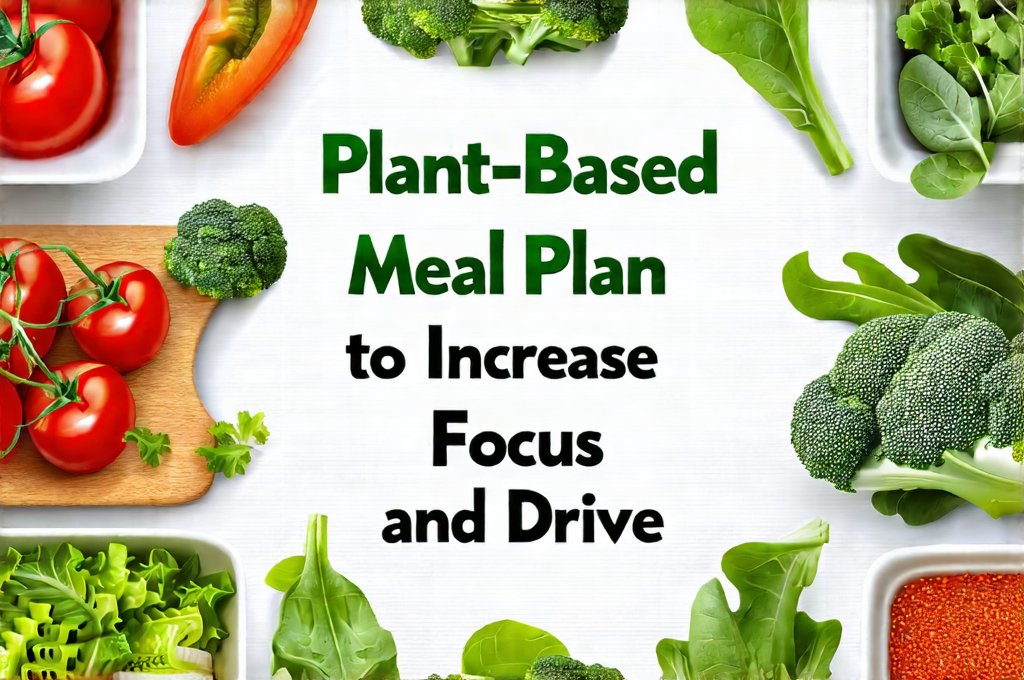Our modern lives demand an incredible amount from us – constant connectivity, demanding workloads, and a relentless stream of information. It’s no wonder so many people struggle with maintaining focus and drive throughout the day. Often, we look to quick fixes like caffeine or sugary snacks for temporary boosts, but these provide fleeting energy followed by inevitable crashes. The real key to sustained mental clarity and productivity lies in nourishing our brains with the right fuel – and increasingly, research points toward the power of plant-based nutrition as a cornerstone of optimal cognitive function. This isn’t about restrictive dieting; it’s about embracing foods that actively support brain health and provide consistent energy levels, setting you up for success without the jitters or crashes.
This article will explore how a thoughtfully designed plant-based meal plan can significantly enhance your focus and drive. We’ll move beyond simply eliminating animal products and delve into specific food choices and dietary strategies that optimize cognitive performance. The goal isn’t just to eat ‘healthy,’ but to strategically select foods that provide the nutrients our brains crave, fostering sustained energy, improved concentration, and a sharper mental edge. We’ll discuss practical meal ideas, essential nutrients, and how to build a sustainable plant-based lifestyle that supports your ambitions – both personal and professional.
The Brain-Boosting Power of Plants
The connection between diet and cognitive function is undeniable. Our brains are incredibly energy intensive organs, consuming approximately 20% of our daily caloric intake despite representing only about 2% of our body weight. What we feed our brains directly impacts its ability to perform optimally. Plant-based diets are naturally rich in nutrients crucial for brain health, including antioxidants, vitamins, minerals, and healthy fats – all without the inflammatory components often found in animal products. Inflammation has been increasingly linked to cognitive decline and reduced focus, making an anti-inflammatory diet a powerful tool for mental clarity.
Many plant foods contain compounds that protect against oxidative stress, a major contributor to brain aging and impaired function. Berries, for example, are packed with anthocyanins, potent antioxidants known to enhance memory and learning. Similarly, leafy green vegetables provide folate, essential for neurotransmitter production, which plays a vital role in mood regulation and cognitive processing. Crucially, plant-based diets tend to have a lower glycemic index than diets high in animal products and processed foods, resulting in more stable blood sugar levels – preventing energy spikes and crashes that can severely impact focus.
Furthermore, the fiber content of plant-based meals promotes gut health. Emerging research highlights the gut-brain axis, demonstrating a strong link between our digestive system and brain function. A healthy gut microbiome supports neurotransmitter production and reduces inflammation, positively influencing cognitive performance. This symbiotic relationship emphasizes that what we eat doesn’t just nourish our bodies; it directly impacts our mental state.
Essential Nutrients for Focus & Drive
Focus and drive aren’t simply about willpower—they depend on a complex interplay of nutrients working together. Here are some key players to prioritize in your plant-based meal plan:
- Omega-3 Fatty Acids: Often associated with fish, omega-3s (specifically ALA) can be sourced from flaxseeds, chia seeds, hemp seeds, and walnuts. They’re vital for brain cell structure and function, improving cognitive performance and mood. Consider incorporating a daily tablespoon of flaxseed meal into your smoothie or oatmeal.
- B Vitamins: Found abundantly in leafy greens, legumes, and fortified plant-based milks, B vitamins are essential for energy production and nerve transmission. Vitamin B12 is particularly important to supplement on a fully plant-based diet as it’s primarily found in animal products.
- Magnesium: This mineral plays a role in over 300 enzymatic reactions in the body, including those related to brain function and stress regulation. Excellent sources include dark chocolate (70% cacao or higher), spinach, and pumpkin seeds.
- Iron: While often associated with meat, iron can be obtained from plant sources like lentils, beans, tofu, and fortified cereals. It’s crucial for oxygen transport to the brain, preventing fatigue and improving concentration. Combining iron-rich foods with vitamin C enhances absorption.
Building a Sustainable Plant-Based Routine
Transitioning to a plant-based diet doesn’t have to be overwhelming. Start small and focus on gradual changes rather than drastic overhauls. Here’s a step-by-step approach:
- Meatless Mondays: Begin by committing to one meat-free day per week, experimenting with vegetarian recipes and exploring new plant-based ingredients.
- Swap it Out: Gradually replace animal products with plant-based alternatives. For example, swap cow’s milk for almond or oat milk, beef for lentils in your chili, and chicken for tofu in stir-fries.
- Plan Your Meals: Meal planning is key to success. Take time each week to create a grocery list based on healthy plant-based recipes. This prevents impulsive unhealthy choices when you’re short on time.
- Focus on Whole Foods: Prioritize whole, unprocessed plant foods like fruits, vegetables, legumes, grains, nuts, and seeds. Limit processed vegan alternatives, which can often be high in sugar and unhealthy fats.
- Hydrate Regularly: Don’t underestimate the importance of water! Dehydration can significantly impact cognitive function. Aim to drink at least eight glasses of water throughout the day.
Sample Meal Plan for Enhanced Focus
Here’s a sample meal plan designed to boost focus and drive, incorporating the nutrients mentioned above:
- Breakfast: Oatmeal with berries, flaxseeds, and a sprinkle of walnuts; fortified plant-based milk.
- Lunch: Large salad with mixed greens, lentils, quinoa, avocado, and a lemon-tahini dressing.
- Snack: Apple slices with almond butter or a handful of pumpkin seeds.
- Dinner: Stir-fry with tofu, broccoli, bell peppers, brown rice, and a tamari-ginger sauce.
- Evening Snack (if needed): Small portion of dark chocolate (70% cacao or higher)
This is just a starting point – feel free to customize the plan based on your preferences and dietary needs. The key is consistency and mindful eating, focusing on nourishing your brain with the fuel it needs to thrive. Remember: This isn’t about perfection; it’s about progress. Small, sustainable changes can yield significant results in terms of focus, drive, and overall well-being.




